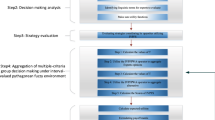Abstract
This paper presents a novel group decision making method for integrating outcome preferences in the first-level hypergame models where each player correctly perceives the strategy set, but perceives possibly different outcome preferences of the opponent players. To get more correct preferences information in hypergame models, each player is often consisted of a group of decision makers who can give their perception about opponent players’ preferences respectively. In the face of opponent players’ different linguistic preferences relations over outcome space perceived by different decision makers, a group fuzzy preferences relation is first accurately computed using standard fuzzy arithmetic operations. Concept of consensus winner is then introduced to decide the crisp outcome preference vectors. A numerical example is provided at the end to illustrate the method.
This work is supported by National Natural Science Foundation of China Grant #70471031.
Preview
Unable to display preview. Download preview PDF.
Similar content being viewed by others
References
Wang, M., Hipel, K.W., Frase, N.M.: Solution concepts in hypergames. Applied Mathematics and Computation 34, 147–171 (1989)
Putro, U.S., Kijima, K., Takahashi, S.: Adaptive learning of hypergame situations using a genetic algorithm. IEEE Transactions on Systems, Man and Cybernetics-Part A: Systems and Humans 5, 562–572 (2000)
Hipel, K.W., Wang, M., Frase, N.M.: Hypergame analysis of the Falkland Island crisis. Internat. Stud. Quart. 32, 335–358 (1988)
Hipel, K.W., Dagnino, A., Frase, N.M.: A hypergame algorithm for modeling misperceptions in bargaining. J. Environmental Management 12, 131–152 (1988)
Herrera, F., Herrera-Viedma, E., Verdegay, J.L.: A rational consensus model in group decision making using linguistic assessments. Fuzzy Sets and Systems 88, 31–49 (1997)
Dubois, D., Prade, H.: Ranking of fuzzy numbers in the setting of possibility theory. Inform. Sci. 30, 183–224 (1983)
Buckley, J.J.: Ranking alternatives using fuzzy numbers. Fuzzy Sets and Systems 15, 21–31 (1985)
Kacprzyk, J., Fedrizzi, M., Nurmi, H.: Group decision making and consensus under fuzzy preferences and fuzzy majority. Fuzzy Sets and Systems 49, 21–31 (1992)
Author information
Authors and Affiliations
Editor information
Editors and Affiliations
Rights and permissions
Copyright information
© 2005 Springer-Verlag Berlin Heidelberg
About this paper
Cite this paper
Song, Y., Wang, Q., Li, Z. (2005). A Group Decision Making Method for Integrating Outcome Preferences in Hypergame Situations. In: Wang, L., Jin, Y. (eds) Fuzzy Systems and Knowledge Discovery. FSKD 2005. Lecture Notes in Computer Science(), vol 3613. Springer, Berlin, Heidelberg. https://doi.org/10.1007/11539506_84
Download citation
DOI: https://doi.org/10.1007/11539506_84
Publisher Name: Springer, Berlin, Heidelberg
Print ISBN: 978-3-540-28312-6
Online ISBN: 978-3-540-31830-9
eBook Packages: Computer ScienceComputer Science (R0)




